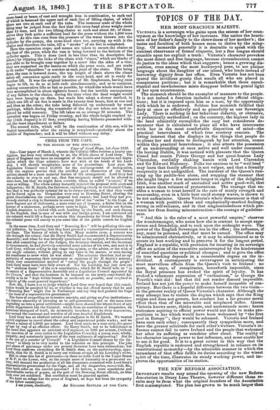TOPICS OF THE DAY.
HER MOST GRACIOUS MAJESTY.
VICTORIA is a sovereign who gains upon the esteem of her coun- trymen as the knowledge of her increases. She unites the hearti- ness of her father's family to the shrewdness of her mother's ; the tastes and faculties' of both houses seem to thrive by the ming- ling. Of monarchs generally it is desirable to speak with the strictest observance of formal etiquette, lest a free tongue should stumble upon too explicit a truth : Victoria's character provokes the most direct and free language, because circumlocution cannot do justice to the ideas which that suggests ; hence a growing dis- position, even among the most hackneyed pens, to use plainer language about the daughter of our island, who lends instead of borrowing dignity from her office. Even Victoria has not been spared the invidious gossip that assails all who are placed in conspicuous positions ; but it is remarkable that those unsub- stantial and unwholesome mists disappear before the genial light of her open countenance. The monarch should be the exemplar of manners to the people. It is not indeed a function included among his official obliga- tions ; but it is imposed upon him as a man, by the opportunity with which he is endowed. Seldom has monarch fulfilled that duty at once so effectively and so gracefully as our Sovereign Lady. There is nothing in her behaviour didactic or obtrusive, or pedanticallymethodized; on the contrary, the highest lady in the land admirably exemplifies the easy but considerate de- meanour that is calculated to place all who have intercourse with her in the most comfortable disposition of mind—the practical benevolence of which true courtesy consists. The living interest that she displays in the things that people do to please her and desire to distinguish by her attention, comes within this practical benevolence ; it also attests the possession of an understanding at once active and well under command. On leaving Dublin, it was noticed with pleasure that the Queen kissed her cousin Prince George and her quasi-hostess Lady Clarendon, cordially shaking hands with Lord Clarendon and Sir Edward Blakeney. Folks too anxious to be "well bred" may learn that family affection is not vulgar' and that a friendly reciprocity is not undignified. The incident of the Queen's run- ning up the paddle-box alone, and stopping the steamer that she might linger a few minutes longer in sight of the delighted Irish, was another mark of unstudied and active good-will, that • says more than volumes of protestations. The courage that en- ables a woman to trust herself in the care of niatily strength and seamanship, even in a little boat amid stormy waves, is shown to be not unfeminine. Queen Victoria's whole demeanour is that of a woman with positive ideas and emphatically-marked feelings, strong in self-reliance, and in that singlemindedness which pre- vents her from fearing misconstruction—the courage of guileless- ness.
"And this is the ruler of a most powerful empire," observes the wondermonger, who notes how she is content to accept expe- rience and friendship, and to rock upon the midnight wave. The power of the English Sovereign lies in the office ; the influence, if any, must be personal, and that must be earned. The office may be administered obstructively, or it may be administered so as to secure its best working and to preserve it for the longest period. England is a republic, with provision for insuring in its sovereign office an action of the executive uninterrupted by the hinderances of unsettled questions or political changes ; and to give the office its true working depends in a considerable degree on the in- dividual. A contemporary is extravagant in anticipating the most marvellous effects from the Queen's visit to Ireland : no more, he says, of conspiracies, henceforth impossible, since the Royal presence has evoked the spirit of loyalty. It has evoked a vehement expression of "enthusiasm," as George the Fourth's visit did : but that did not render discord impossible. Ireland has not yet the power to make herself incapable of con- spiracy. But there is a hopeful difference between the two visits— in the greater reality of Queen Victoria's character. Although she may attempt less to violate the dogma which says that the King reigns and does not govern, her conduct has a far greater moral effect than that of the miserable and misplaced trifler. Queen Victoria knows more, thinks more, and understands more : hence statesmen aspiring to official power would not dare to make pro- positions to her which would have been welcomed by "the first gent in Europe"; they would be ashamed. Victoria and Ireland have seen each other; consequently they sympathize more, and have the greater solicitude for each other's welfare. Victoria's in- fluence cannot fail to serve Ireland and the people that welcomed her after its suffering as sunshine after cloud. The reality of her character imparts power to her influence, and must enable her to use it for good. It is to a great extent in this way that the English republic is endeared and strengthened in reliance on its constitutional monarchy—by the admirable manner in which the incumbent of that office fulfils its duties according to the wisest spirit of the time, illustrates its steady working power, and im- proves the opportunities of its station.


























 Previous page
Previous page